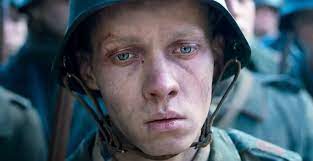By MSGR. JOHN MYLER
Culture Columnist
World War One ended in 1918 on the “eleventh day of the eleventh month at the eleventh hour.”
Now streaming on Netflix—ahead of Veterans’ Day—is a new film version of ALL QUIET ON THE WESTERN FRONT, loosely based on Erich Maria Remarque’s classic 1928 novel. A group of fresh-faced and eager German schoolboys (innocent 17 year old Paul Baumer as narrator) enlists and heads off to fight in France —“the western front.” Very quickly, their idealistic patriotism is replaced by the horror of life and death in the trenches—blood and barbed wire, meager rations and hungry rats, rain and mud and mustard gas.
Watching the new film—produced in Germany (where the novel was later banned and burned by the Nazis)—is, even for modern viewers, a battle against a barrage of relentless brutality. Its violence is much more graphic than the 1930 American version (an early Best Picture Oscar-winner) and the 1979 made-for-TV movie with Richard Thomas (of “The Walton’s”).
In ALL QUIET ON THE WESTERN FRONT, the destruction of war is depicted as deadly for both body and soul—and, unlike movies that tend to glorify the battlefield, this film as well as Remarque’s novel
are decidedly anti-war.
World War One has been the setting of many movies, from the silent film “Wings” to Gary Cooper as “Sergeant York”; and—in the last ten years—the colorized archive-documentary “They Shall Not Grow Old”, the moving post-war drama “Franz”, and the excellent “1917”.
The message of all these is, unfortunately, timeless—because “the war to end all wars” has given way to more wars throughout the 20th century, and even today.
(Has a “war movie” ever struck you as a statement for peace? I’d like to know: jmyler@diobelle.org)







